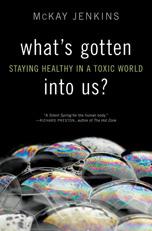Shampoo as a Hidden Threat
What’s Gotten Into Us? Staying Healthy in a Toxic World, by McKay Jenkins ’85 (Random House)
Reviewed by Katherine Jamieson
 |
[Health] In the late 1800s, “neurasthenia” was the name given to a class of illnesses that caused people, largely women, to lose their minds, see ghosts and end up locked away in sanitariums. Doctors blamed the stressful pace of life.
In What’s Gotten Into Us?, by journalist and professor McKay Jenkins, toxicologist Albert Donnay theorizes that the culprit was actually carbon monoxide from gas-fired lamps—and he believes we’re in a similar predicament today, when chronic exposure to pesticides, formaldehyde and carbon monoxide is at a record level.
Jenkins—who wrote this book after being diagnosed with a tumor the size of an orange in his abdomen—argues that we are unwitting guinea pigs of the chemical industry. Eighty thousand chemicals are thought to be in use today, he writes, but 99 percent have never been tested for their effects on human health.
These chemicals are everywhere—in shampoos, paints, carpets and baby bottles. They accumulate in our bodies: our tissues, blood, breast milk and organs. Petrochemicals have been found in Canada’s beluga whales. PCBs, a class of banned organic compounds, have shown up in snow on the highest mountain in the Andes. Seals above the Arctic Circle carry flame retardants in their blubber. Citing scientific research, Jenkins makes a convincing case that this toxic assault is making us sick, and instead of waiting for proof of harm, he says, the United States should follow the European model of proving “exposure”: if a chemical is made in high volume or is detected in people or wildlife, companies must divulge its presence and purpose in their products; in some cases, the government can ban products that contain the chemical.
Sweden prohibited the use of flame retardants in late 1999, and a follow-up study found that levels in breast milk dropped 30 percent in three years. Here in the United States, we’re not so lucky. The majority of Americans continue to be, in the words of British physician Richard Horton, “experimental animals in a vast and largely uncontrolled study.”
Freelance writer Jamieson has a background in alternative health.